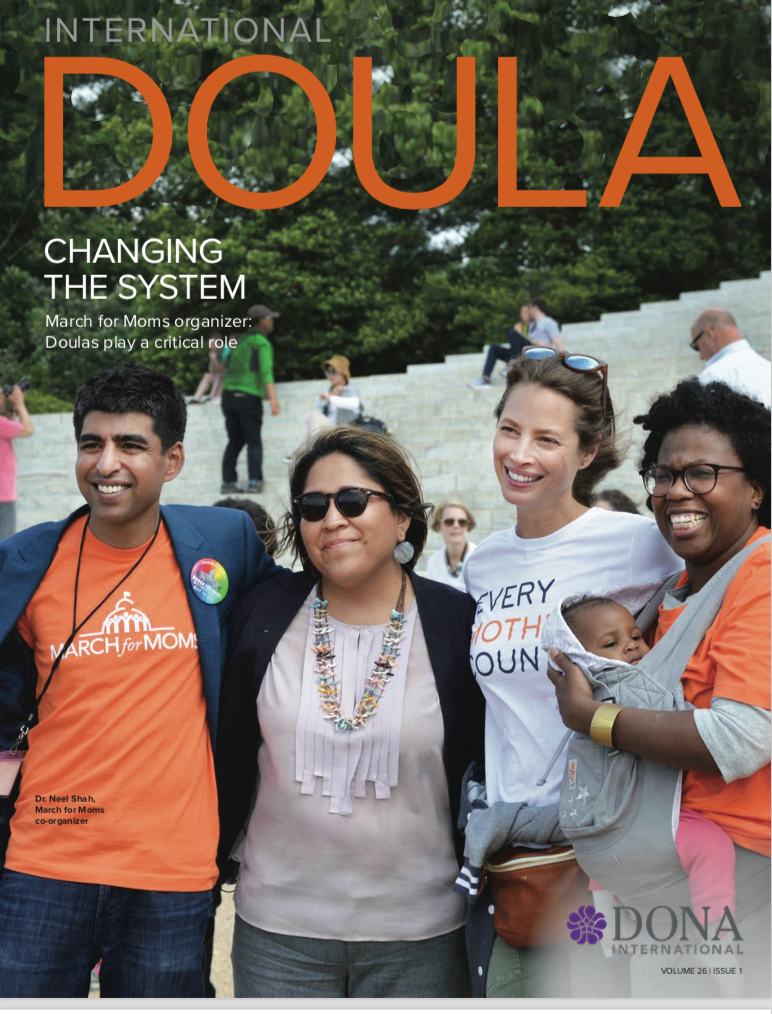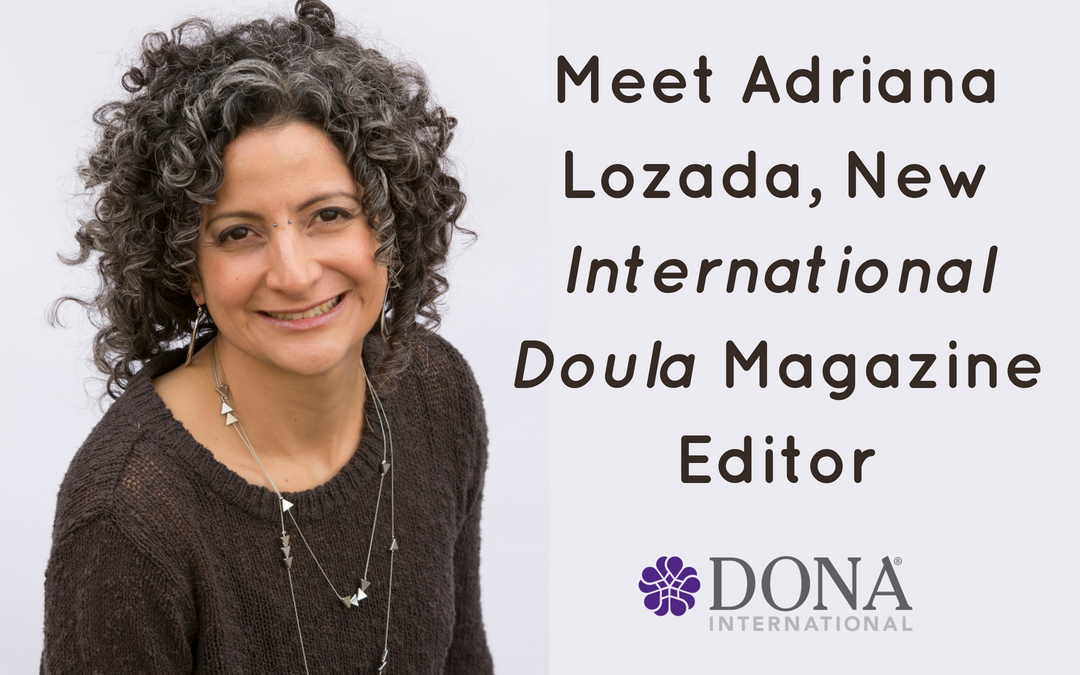By Sharon Muza, BS, CD(DONA), BDT(DONA), LCCE, FACCE, CLE
DONA International shared earlier this week that Adriana Lozada, AdvCD(DONA), CSC, CEMC, CBP, was named as the new editor for the International Doula, DONA International’s well-respected quarterly magazine. DONA International publishes this magazine four times a year and it is delivered to the inbox of DONA members worldwide. I am excited that my friend and colleague Adriana is joining the DONA International publications team, and I look forward to collaboration with her in the future, in my role as blog manager.
Adriana Lozada’s background is multi-layered and multi-cultural. A former print and online editor from Venezuela, the birth of her daughter sparked her passion for being a birth advocate, leading her to open Birthful: a company that helps new and expectant parents take on whatever maternity sends their way. She is a certified Advanced Birth Doula (DONA International), a postpartum educator, a healthy sleep consultant, speaker and bestselling author. Since 2014, Adriana has also been the host of the Birthful Podcast, where she talks to amazing, knowledgeable, and passionate birth professionals every week, to help new and expectant parents inform their intuition. Adriana lives in Rochester, NY with her husband and 13-year-old daughter.
I asked Adriana some questions as she settles into her new role and I am super excited for what is to come.
Sharon Muza: In this age of digital media, why is it important for DONA International to continue to produce a hard copy magazine/journal such as the ID?
Adriana Lozada: Fortunately, there is a place for all types of media! However, the rise of digital content does create the opportunity for a deeper exploration into the unique characteristics -the essence if you will- of a hard copy magazine. What are those things that a quarterly journal can deliver better than a 280 character tweet, an Instagram story, or a blog post? This honing-in is not limited to word-count, but also to “expiration date” and relevancy. It’s not unlike the exploration needed when comparing a daily publication with a quarterly journal, for example.
 I personally love the relationship you can have with hard copy journals: how the content is not as disposable as daily posts, but usually still more dynamic than books. How you won’t necessarily digest it in one sitting but probably return to it over time. It’s a more intentional interaction, with the reader coming at it with a desire to absorb knowledge and to explore their own thoughts on the topic. So what content should we provide to live up to those expectations? That’s the question I’m going to keep asking myself.
I personally love the relationship you can have with hard copy journals: how the content is not as disposable as daily posts, but usually still more dynamic than books. How you won’t necessarily digest it in one sitting but probably return to it over time. It’s a more intentional interaction, with the reader coming at it with a desire to absorb knowledge and to explore their own thoughts on the topic. So what content should we provide to live up to those expectations? That’s the question I’m going to keep asking myself.
SM: What are some of your previous experiences and background that will help you to do this job and do it well?
AL: I was co-founder and managing editor of a nationwide weekly publication in Venezuela during my twenties, so I have ample experience in crafting a print journal, requesting submissions, working with varying personalities, supervising layout design, and meeting deadlines.
My experience with the Birthful podcast will also come in handy. Over the past 3+ years, I’ve interviewed, and connected with dozens of maternity professionals, to talk about a myriad of topics. I plan to reach out to many of them to further expand the breadth of the content in the International Doula magazine.
SM: What have you personally enjoyed about the ID as a doula.
AL: In terms of topics, I have a soft spot for the more practical articles that provide tangible tools to use in my doula practice. I also enjoy the features that are coupled with “DONA Trainer Insights” for similar reasons.
SM: Spanish is your first language – any thoughts on producing this magazine in both Spanish and English?
AL: ¡Sería super interesante!
SM: What type of content does today’s doula want to see in and receive from the ID.
AL: I think they want to see a mix of practical articles that will help them grow the way they practice –whether it’s as a birth doula, postpartum doula, or both– along with features that will help keep them informed about cultural, political, medical, and systemic changes and trends in maternity care and maternal health. I think they want to see pieces that are both insightful and evidence-based. Topics that consider advocacy, diversity, and disparities.
SM: Do you have a special article or issue that you recall that has really stayed with you since you started reading the ID?
AL: I’ve really enjoyed the article from last year on “Keeping Clients’ Needs First as a Hospital-Based Doula”, and its companion article on “Eight Ways Hospital-Based Doulas Support Great Births”. More recently, I really liked the article on community doula programs. As doulas become more sought after by all populations and birth settings, we need to take the time to reflect on how we can best serve our clients.
SM: What should people do if they would like to contribute and/or have suggestions or comments about the ID?
AL: Write me directly at IDeditor@dona.org, please! You have my attention, so do send me your submission ideas, suggestions, and comments. I want this publication to be something you forward to; tell me what you’d like to see!



This is exciting news. I love listening to her Birthful podcasts. As a brand new doula, I have learned so much from listening.